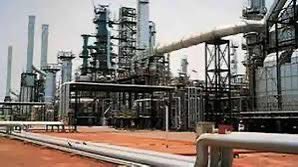By Adeyemi Adekunle
The Nigerian National Petroleum Company Limited (NNPC Ltd.) has announced that the Kaduna Refinery and the Port Harcourt Refinery are undergoing a significant and unprecedented rehabilitation effort, designed to modernize the facilities and align them with global operational standards.
This initiative, the company says, is part of its broader strategy to revolutionize Nigeria’s refining sector, boost domestic fuel production, and reduce the country’s dependence on imported petroleum products.
In a detailed statement released by the company’s Chief Corporate Communications Officer, Olufemi Soneye, revealed that this rehabilitation is not the conventional Turnaround Maintenance (TAM) historically conducted at these facilities. Instead, it represents a full-scale overhaul aimed at addressing decades of underperformance and inefficiencies.
The ongoing work at the 150,000 barrels per day (bpd) Port Harcourt Refinery, its 60,000 bpd counterpart, and the Kaduna Refinery reflects the NNPC’s commitment to creating a sustainable and self-reliant energy future for Nigeria.
Soneye highlighted the progress already achieved at the Warri Refinery and the smaller Port Harcourt Refinery, both of which have successfully undergone similar rehabilitation efforts. The ongoing projects at the Kaduna Refinery and the larger Port Harcourt facility are expected to follow this successful model. He emphasized that these facilities are critical to ensuring sustainable, efficient operations capable of meeting the country’s energy demands and supporting economic growth.
Response to Former President Obasanjo’s Concerns
The announcement comes on the heels of comments from former President Olusegun Obasanjo, who recently expressed skepticism about the viability and operational status of Nigeria’s refineries. Citing insights from Shell Petroleum Development Company, Obasanjo questioned the sustainability of the Port Harcourt Refinery and accused the NNPC of presenting an overly optimistic picture of the refineries’ condition.
Responding to these concerns, Soneye extended an open invitation to Obasanjo to visit the refineries and witness firsthand the progress made in their rehabilitation. “We extend an invitation to our esteemed former president to join us in this historic journey. His wisdom and experience are invaluable, and we deeply appreciate his insights and guidance,” Soneye said. He also expressed the company’s respect for Obasanjo’s long-standing contributions to national development, particularly in the energy sector.
“His opinions on matters of national importance are highly respected, and we are keen to demonstrate our commitment to achieving the vision of a self-sustaining refining industry,” Soneye added.
A New Chapter for NNPC
Under the leadership of Group Chief Executive Officer Mele Kyari and bolstered by President Bola Tinubu’s energy policies, the NNPC has undergone a transformative journey from a loss-making public corporation to a profit-driven global energy company. The company has successfully embraced a new business model, focusing on operational efficiency, revenue generation, and the integration of sustainable energy solutions.
This transformation, Soneye explained, is central to NNPC’s efforts to reposition itself as a leading player in the global energy market while simultaneously addressing Nigeria’s domestic energy challenges.
The ongoing refinery rehabilitation projects are a cornerstone of this strategy, aimed at reducing Nigeria’s dependency on fuel imports and conserving foreign exchange.
The rehabilitation also reflects the company’s commitment to embracing a balanced energy future that integrates traditional fossil fuel operations with cleaner, more sustainable energy technologies.
“These projects are designed not only to meet current demands but also to position Nigeria as a key player in the global energy market,” Soneye stated.
A Technical and Structural Overhaul
The work being conducted at the refineries is unprecedented in scope and ambition. It goes beyond routine maintenance to address fundamental structural, operational, and technological deficiencies that have plagued the facilities for decades.
At the Port Harcourt Refinery, the 150,000 bpd unit is undergoing significant upgrades to improve crude oil processing efficiency and ensure adherence to international standards. The 60,000 bpd facility, which has already been rehabilitated, serves as a model for the ongoing work. Similarly, the Kaduna Refinery, a key asset in Nigeria’s refining landscape, is being re-engineered to resume full-scale operations and contribute meaningfully to the nation’s domestic fuel supply.
The Warri Refinery, which was one of the first to undergo this comprehensive rehabilitation, is now operating at enhanced capacity. Soneye noted that the lessons learned from the Warri project have been instrumental in guiding the ongoing work at the other facilities, ensuring efficiency and cost-effectiveness.
Economic and Social Impacts
The benefits of these rehabilitation projects extend far beyond the refineries themselves. By increasing domestic refining capacity, Nigeria can significantly reduce its reliance on imported petroleum products, which have historically drained the country’s foreign exchange reserves. This shift will also help stabilize fuel prices, reduce the fiscal burden on the government, and improve the overall economic outlook.
Moreover, the revitalization of these facilities is expected to generate significant employment opportunities, both during the rehabilitation phase and once operations resume. This includes jobs for engineers, technicians, and support staff, as well as opportunities for local contractors and suppliers. The ripple effects of this economic activity will be felt in the host communities and beyond, stimulating local economies and fostering development.
Soneye emphasized that these projects are aligned with NNPC’s vision of becoming a fully integrated energy company that drives national growth and development. “We are committed to delivering world-class energy solutions that not only meet Nigeria’s current needs but also position us for a sustainable future,” he said.
Transparency and Stakeholder Collaboration
NNPC has reiterated its commitment to transparency and accountability throughout the rehabilitation process. The company has actively engaged with stakeholders, including government agencies, private sector partners, and the Nigerian public, to ensure that the projects are executed efficiently and effectively.
Soneye pointed to the strategic partnerships NNPC has forged with leading global firms as a testament to the company’s dedication to excellence. These collaborations have brought in world-class expertise, cutting-edge technology, and international best practices, ensuring that the refineries are restored to optimal performance.
He also stressed the importance of public understanding and support, noting that the success of these projects requires collective effort. “Our refineries are national assets, and their successful rehabilitation is a shared responsibility. We are committed to maintaining open lines of communication with all stakeholders to build trust and ensure accountability,” Soneye said.
A Vision for Nigeria’s Energy Future
As the world grapples with the challenges of a rapidly evolving energy landscape, Nigeria’s ability to adapt and innovate will be crucial. The successful rehabilitation of its refineries represents a significant step toward securing the country’s energy independence and economic resilience.
Soneye assured Nigerians that NNPC remains steadfast in its mission to achieve these goals. “Our refineries are critical national assets, and their rehabilitation is a top priority. We are confident that these efforts will yield lasting benefits for the Nigerian economy and its people,” he concluded.
The comprehensive overhaul of the Kaduna and Port Harcourt refineries marks a defining moment for Nigeria’s energy sector. With these projects nearing completion, the NNPC is poised to deliver on its promise of transforming Nigeria into a hub of energy excellence, ensuring a brighter and more sustainable future for generations to come.




